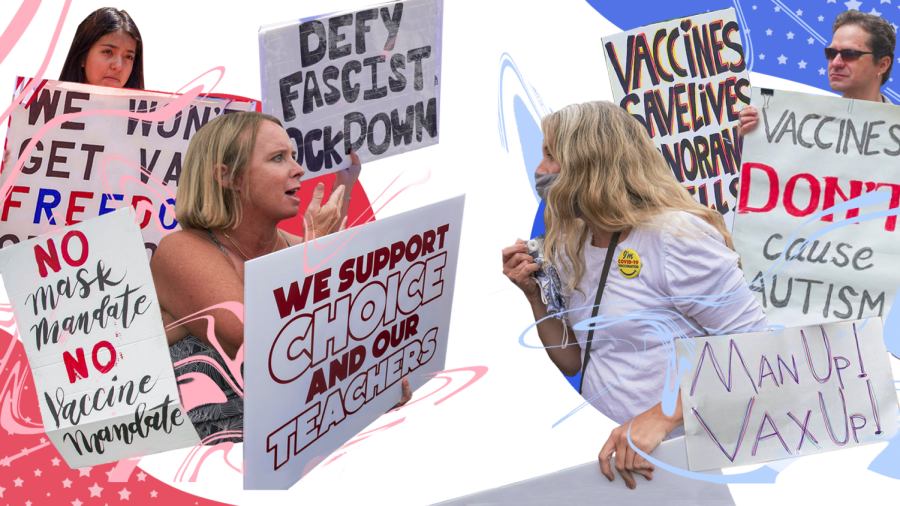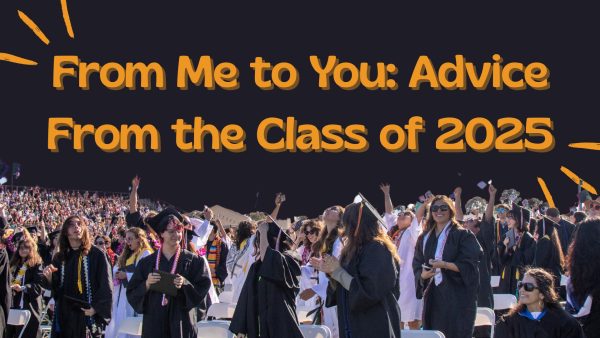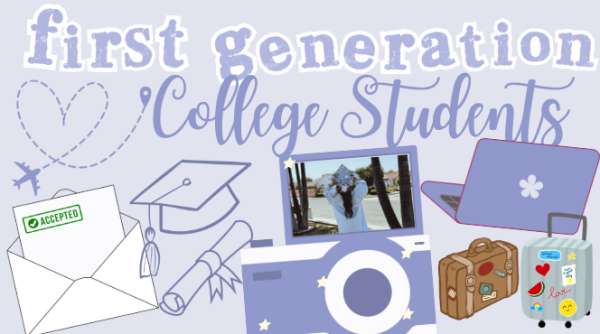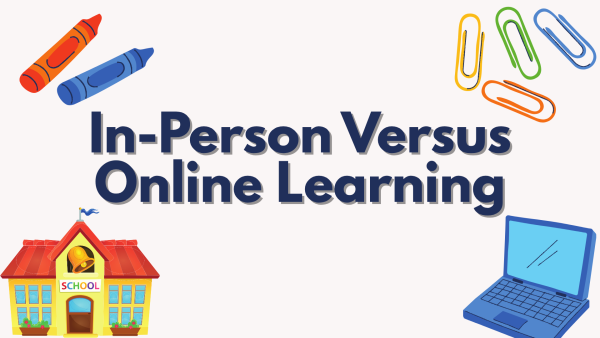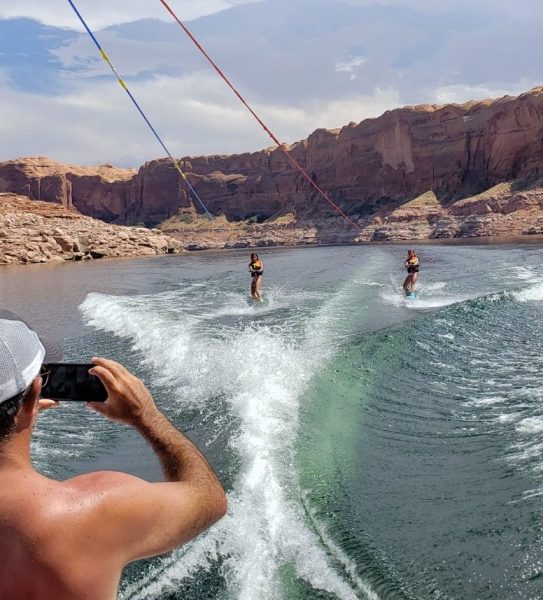An Insight on Vaccine Mandate Beliefs
On September 9th of 2021, a vaccine mandate was finalized by the Board of Education, requiring all schools underneath the Los Angeles Unified School Districts (LAUSD) to have children twelve and older fully vaccinated for COVID-19 before January 10th, 2022.
However, this recent approval of the L.A. Unified School Board’s vaccine mandate has garnered both opposition and support for its attempts to fight the effects of COVID-19. Concern from parents, students, and even faculty members have risen against school districts statewide.
Although the mandate seems to have been approved swiftly and without any warnings, early preemptive measures may have been gradual changes that led to the vaccine mandate. After the return of thousands of students to in-person schooling in August of 2021, LAUSD required all students and staff to undertake a required COVID-19 test, followed by a weekly mandatory checking for any positive results. Any students or staff with a positive test were unable to enter the school’s grounds for at least 10 days after self-quarantining.
UC Schools have also adopted procedures to test and require vaccination status for all students before admission in the fall semester.
In addition to the required COVID testing, in the state of California, masks are required for all schools— despite other highly-populated states, such as Texas, Florida, and Arizona that dropped this mandate.
Following COVID mandate after COVID mandate, school communities all around California have demonstrated mixed opinions on whether or not these procedures are necessary. Many families have given their reasons as to why they are not getting the vaccine, however, factors such as religious beliefs, health issues, and personal views of freedom have seemingly halted the process of a vaccine requirement statewide altogether.
Religious tolerance for vaccines in California has had a long history prior to the pandemic caused by COVID-19; California officials discontinued personal belief exemptions as of 2015 that allowed students to remain unvaccinated. But as the recent demands of COVID vaccinations have become more of a reality than a pipe-dream, religious parents and staff have shared their thoughts on how religion should be a valid exception.
“It is a grotesque overreach of authority, and it can’t stand. My prayer every day is that this entire charade implodes upon itself because it’s so wrong,” says Stephanie Dawn, a six-year anti-vaccine advocate who moderates online anti-vax Facebook groups.
Dawn added, “If anything happens to my children, knowing that big pharma, Pfizer, and Moderna have no liability. Do [schools] have liability if [they’re] going to mandate this on my children? Because if [they’re] not, then I completely, 100% reject this, and I’ve written them a personal belief exemption, and a right to refusal letter. They aren’t responding to me now.”
“Many are choosing to disclose the reasons they are declining [the vaccines] which include valid medical and sincerely held beliefs as the reasons,” adds Sarah King, an art teacher based in Sacramento. “[School boards] should be putting inclusion, diversity, and most importantly equity in the front of their minds when making decisions with regard to the COVID-19 health orders.”
But not all religious community members see the mandate in a negative light, as multitudes of Christians and ex-believers alike combat the reasoning of anti-vaxxers who justify a hypothetical exemption from the vaccine with religion.
“I was raised Catholic and went to church every Sunday,” shares Katie Sievers, a sophomore student who attends Santa Monica High School, a school directly affected by the LAUSD’s mandate decision. “I personally don’t agree with Catholic beliefs. It’s so contradictory because if God made you… able to resist viruses, wouldn’t God also make the vaccine for your protection?”
“I understand some religions,” adds Christian Grombone, a sophomore student who attends Huntington Beach High School, “but if you’re Catholic and say ‘God will protect me,’ It’s really not the same.” Grombone argues with the example of the controversial second amendment, which many Republicans (who identify as Catholic or Christian) use to justify protecting themselves. “Didn’t you say God will protect you? I feel like a lot of people use it as an excuse but don’t use it for other issues. It’s really inconsistent.”
The battle between “God’s Will” and independent responsibility between anti-vaxxers and pro-vaccine individuals will most likely continue, as their beliefs contradict each other in multiple ways. However, it is important to note the intended separation of religion and the state within the First Amendment of the Bill of Rights, which aims to remove all aspects of religious bias within law-making processes. Creating a loophole that allows individuals to bypass vaccination requirements based on religion may interfere with the key concept that no one is above the law.
Along with religious exemption, the argument for medical exemptions from the vaccine has seemingly arisen in popularity with the belief that the vaccine poses a harmful effect on one’s body due to its emergency approval status.
“This is an emergency use [of] unauthorized medicine. Our children are not guinea pigs,” refutes Dawn when asked about the safety of the vaccine in general. “We should not be mandating an emergency use authorization medicine on our children — at all. I don’t believe in vaccination as ‘medicine–’” Dawn emphasizes. “In fact, there is a whole school of thought that believes vaccines cause cancer…You may want to look it up,” she adds.
“I read somewhere that people who got the vaccine in Afghanistan died. It wasn’t Pfizer or Moderna or the other one,” shares Brandon Matthews, a senior at HBHS. “Look it up yourself and you’ll see that statistics show that as more people got the vaccine, the more death rates spiked,” he adds, questioning the legitimacy of the vaccine.
Although there are some cases in which the COVID-19 vaccine does impact the welfare of a small minority, research provided by the Centers for Disease Control and Prevention (CDC) explains that the systems in place to monitor the safety of these vaccines have found two serious types of health problems after vaccination, both of which are rare… occurring at a rate of about 7 per 1 million vaccinated women between 18 and 49 years old. For women 50 years and older and men of all ages, this adverse event is even more rare. The CDC prefaces the safety concerns of the COVID-19 vaccine with reassurance that although the vaccine variants such as Pfizer and Moderna utilize RNA that is similarly used in clinical trials to treat cancer, it is not a direct byproduct of the vaccine and contains zero correlation.
A teacher at HBHS who wishes to remain anonymous, however, shares “that all the necessary steps for FDA approval were followed for approval… some of the paperwork/processes were delayed which necessitates ‘emergency’ approval. No steps in the scientific method were skipped.”
Many communities in general are rejecting the adoption of vaccine requirements because of their values and beliefs of the importance of civil freedom. Anyone, regardless of their background or political standing, has a right to an opinion. Some parents suggest that the breach of personal choices is a reality made possible by the vaccine mandate, while others suggest that it is a necessary step to help the community. But when these opinions possess the possibility to prolong the spread of COVID-19, should the ability to choose be restricted by school boards?
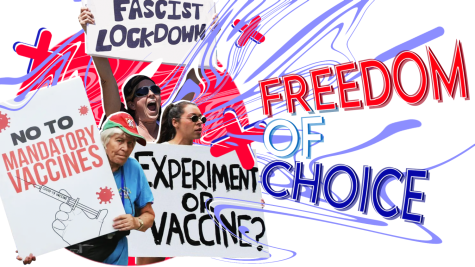
“The reason for declining to abide by vaccination or testing orders is not the Department of Health or the district’s business at all and is a fundamental civil right” protests King. “[School boards] should be putting inclusion, diversity, and most importantly equity in the front of their mind when making decisions with regard to the COVID-19 health orders.”
“I definitely feel like the school has a right in a sense to say you have to be vaccinated to come to school,” shares Sievers. “Making baby steps (such as introducing COVID testing requirements for all students) would help a lot more, [and] I do think that a COVID vaccine being required isn’t necessarily a bad thing. More people should warm up to it.”
And as these “baby-steps” have already been made, such as the mask mandate and the weekly required testing of all staff LAUSD; the reality of the pandemic is still questioned by some who argue that the existence of the virus is a hoax.
“I do not want anything. I do not want masks…We do not have an emergency where our children are concerned. We have more deaths because of the vaccine than we do from the supposed virus,” Dawn explains when talking about the current state of emergency. “I think everything is [a] grotesque overstatement, that the numbers are completely inflated, and I honestly don’t think we have a pandemic. If we had a pandemic, I would have heard of hundreds of children who would have been severely injured by this disease and have died. We don’t have that, at ALL,” she emphasizes. “You can do the research and see that yourself, this is decision-making by big pharmaceutical corporations telling our politicians what to do, who are then creating public policies. It’s completely backwards. We do not need to be taking orders from corporations who are profiting billions on these vaccines. We have innate immune systems for a reason, we need to fuel them with rest, organic foods, vitamin C, vitamin D, [etc.],” Dawn goes on to list out alternatives to the vaccine.
Three of these arguments (religion, health concern, and personal opinions) in conjunction leave individual school boards reconsidering not only the impending vaccine mandate but the preexisting mask mandate as well. Students that took extracurricular activities were once expected to be vaccinated by October 31st of 2021 in guidance to the LAUSD vaccine mandate, however, a recent change of legislation may prove to be a response to parent opposition. Within an article published by The LA Times, reports were made of “the district [having] changed its policy… The extracurricular mandate no longer applies to middle schools and it no longer applies to high school activities that are not sports-related.”
“They’re starting to cave” suggests Dawn excitedly. “[These] mandates are starting to cave, and this affects my son directly. Let’s see how hard we can push them to completely change it. This is a win, and our work is far from over. Hold the line, and hold the light.”
Facebook groups, district school board meetings, protests/rallies, and even student-parent cooperation have put pressure on school boards to reconsider their stance on these mandates. Within recent examples, a State-Wide School Sit Out took place on October 18th which promoted the absence of both students and staff who disagree with the implementation of required vaccinations and masks throughout the state. The flyer promoted all members of school communities to “attend local school board meetings and ask how they are protecting you students’ civil rights.” Displayed within the Huntington Beach Union High School District’s school board meetings, many parents took this opportunity to heart and shared their opinions and supposed facts with school officials.
Shawn Dove, a local Orange County citizen who was a part of Huntington Beach School District’s retired Fight or Flight program, and also holds 19 years of law enforcement experience, challenges fellow parents and district officials. Dove said, “Show me anybody who can legitimately tell me [how] a paper mask will last you anything past 30 minutes or an hour. The true statistics, the serious case rate in the world” he emphasizes, “is .006%” (according to his calculations, which he claims to have done himself before entering the room).
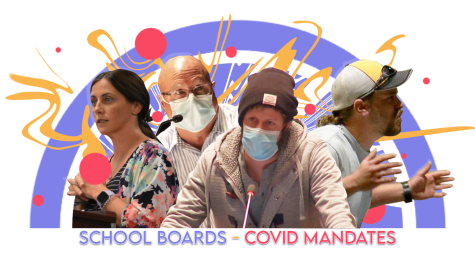
The fight against these mandates, which have been instated to combat COVID-19, seemingly has yet to falter as an overwhelming number of parents are becoming proactive in the movement within California. Whether or not the LAUSD decision will remain finalized forever, or completely altered, is to be determined. Students, staff, and communities as a whole have been split further apart due to the politically-involved matter COVID-19 contains, as many politicians have weighed their campaigns on polar opinions in order to gain more voter support. No matter the individual opinions of the mandates, it seems the decisions made by school districts will never satisfy both sides completely.
Your donation will support the student journalists of Huntington Beach High School. Your contribution will allow us to cover our annual website hosting costs.
Thank you for supporting our program!


